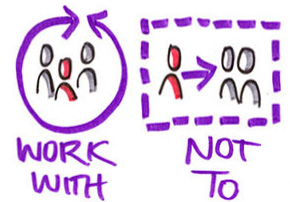Principles of Co-production

What is co-production?
Co-production is about working in partnership with others to make positive change. In the context of children’s services it is about different organisations, professionals, children, young people and families working together to not only identify what changes are needed, but to plan how that change will happen. Co-production is so much more than consultation, and it goes beyond asking people what they think about something, to making sure they are fully involved in all aspects of identifying problems to be solved and designing and implementing the solution.
In the autumn of 2022, as part of the SEND Transformation Programme, local stakeholders working with The Rise Partnership agreed a local definition of co-production:
Co-production is children, young people, parents, carers, and services working together as equals to make a change. Being equal means that everybody’s experiences, voices and ideas have the same value. Co-production happens when all partners work together to identify what needs to change or be developed and how it should be done.
What are the benefits of co-production?
When a co-production approach is taken to working collaboratively with children, young people and families, professionals will benefit from developing a deep knowledge and understanding of the families history, context, lived experience, hopes and ambitions. The approach at once creates a sense of partnership between all those involved where every voice is valued. To often families have reported that the intervention of services has resulted in them being ‘done to’ rather than ‘done with’.
Some of the important benefits of adopting a co-production approach include:
- Gaining a better understanding of the families context and the local picture
- Understanding what works and what doesn’t
- Understanding family structure, relationships, strengths and weaknesses
- More effective targeting of resources
- Stronger accountability (multi-lateral)
- Increased trust and cooperation
- Better outcomes
- Improved relationships with families
- Engaging, appealing and accessible services and products
- A responsive, relevant, and useful service offer – families get what they need
- Ownership among users to champion the services
- Better community resilience
Commitment and expectations of the WSCP
The WSCP endorses a co-production approach wherever possible in working with families. This approach is a key part of our systemic practice model, as it strengthens the trust and relationships between professionals and the family.
The WSCP therefore expects all professionals and partner agencies to adopt, where appropriate a co-production approach. In everyday practice this will include, but is not limited to:
- Identifying and responding to need at the earliest opportunity
- Having a systemic practice approach to working with families
- Including all key members of the family in assessments and the design and review of plans
- Being accessible to family members, and meeting with them when requested
- Keeping plans relevant, regularly reviewed and up to date
- Contributing to multi-agency assessments and plans and participating in reviews
- Attending multi-agency meetings for the child/ young person
- Being child centred and solution focused
- Delivering actions on time
- Being ambitious, professionals and supportive to children, young people and their families
- Being respectful of others, their pressures, capacity and expertise
WIRRAL approach. Remember WIRRAL when you co-produce:
Working Together
· Communicate well
· Work in partnership
· Create strong partnerships so everyone can:
Feel valued and include
Learn from each other
Be honest and transparent
Take responsibility for how we work together
Have a ‘can do’ approach
Inclusive
· Respect everyone’s voice and views, all partners are equal in value
· Create a welcoming environment
Responsible
· Behave considerately
· Represent your area of SEND expertise
Respectful
· Be open to listening to others’ opinions
Ambitious
· Think beyond business as usual
· Aim high for the very best outcomes possible
Lived experiences
· Learn from those with lived experiences to share
· Stay grounded to the reality of Wirral people, their views and lived experiences
· Improve the lived experience
Further information
Wirral Local Offer – co-production Charter
A meeting of minds. How co-production benefits people professionals and organisations
Co-production resources from the Social Care Institute of Excellence
